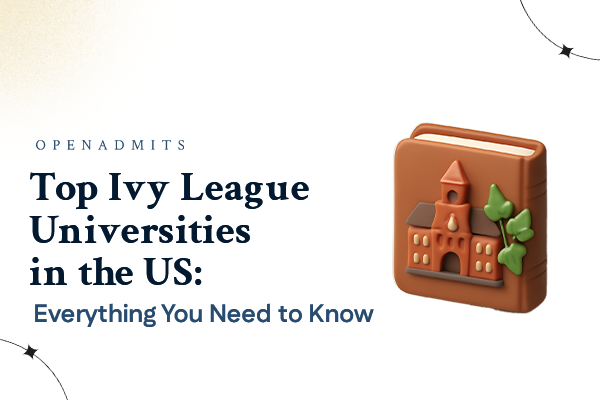Top Ivy League Universities in the US: Everything You Need to Know
Harriny • 15th May, 2025
Somewhere between watching Legally Blonde and bingeing startup success stories, we’ve all filled with the idea of Ivy League glory. The prestige. The power suits. The “Oh, you go to Harvard?” eyebrows raise.
But they are the influence factories. They're where world leaders are shaped, billion-dollar ideas are born, and doors swing open and presidents casually drop knowledge between coffee breaks.
Studies show grads from Ivy League Universities do make significantly more in lifetime earnings up to $1.2M more. Elite education is more geographically and culturally diverse than ever.
What you need to know about the top Ivy League Universities in the US:
1. What Are Ivy League Universities?
The term “Ivy League Universities” started as an athletic conference in the Northeast US, but it's long since outgrown just sports. Today, it’s shorthand for prestige, academic excellence, world-class networks, and serious social capital.
There are 8 original Ivy League Universities:
1. Harvard University – Cambridge, MA
2. Yale University – New Haven, CT
3. Princeton University – Princeton, NJ
4. Columbia University – NYC, NY
5. University of Pennsylvania (UPenn) – Philadelphia, PA
6. Dartmouth College – Hanover, NH
7. Brown University – Providence, RI
8. Cornell University – Ithaca, NY
Each one is dripping in history, backed by billionaire endowments, and famous for producing world-shaping alumni, from presidents to Pulitzer winners.
Must read: GPA Requirements for Ivy League Schools: What You Need to Succeed
2. New Ivies – Now Playing in the Big League
The Ivy League may still dominate conversations around elite education, but a powerful wave of institutions is quietly reshaping the landscape. Forbes recently spotlighted a group of top-performing universities—the “New Ivies”—that are attracting exceptional talent, becoming more selective, and, these universities combine elite-level education with more accessible entry points.
3. What Makes a “New Ivy”?
To earn the “New Ivy” badge, colleges must meet rigorous criteria. The Forbes survey looked for institutions—both public and private—that have become increasingly selective, especially in STEM, innovation, and entrepreneurship. Now compete head-to-head with Ivy League schools in terms of admissions standards, student outcomes, and reputation.
New Ivies into two categories:
**The Public New Ivies: **These public universities combine large-scale resources with increasingly selective admissions and standout research programs:
- Georgia Institute of Technology (Georgia)
- Purdue University -West Lafayette campus (Indiana)
- University of Texas at Austin (Texas)
- United States Military Academy – West Point (New York)
- University of Illinois Urbana-Champaign (Illinois)
- University of Michigan – Ann Arbor (Michigan)
- University of North Carolina at Chapel Hill (North Carolina)
- University of Pittsburgh (Pennsylvania)
- University of Virginia (Virginia)
- William & Mary (Virginia)
**The Private New Ivies: **These private institutions are known for their low acceptance rates, high-achieving student bodies, and innovation in research and learning:
- Carnegie Mellon University (Pennsylvania)
- Emory University (Georgia)
- Georgetown University (District of Columbia)
- Johns Hopkins University (Maryland)
- Northwestern University (Illinois)
- Rice University (Texas)
- Tufts University (Massachusetts)
- University of Notre Dame (Indiana)
- Vanderbilt University (Tennessee)
- Washington University in St. Louis (Missouri)
According to Forbes and US News, their post-grad salaries, research funding, and global reach rival, if not outpace, traditional Ivies in certain fields.
Related article: How to Build a Winning Profile for Ivy League Colleges application in the U.S
4. Why Ivy League Universities?
- Academic Rigor: You’ll be challenged intellectually like never before. These schools don’t hand out A’s like a bed of roses.
- Unmatched Networks: Want to meet a future president? Or launch a startup with VC backing before graduation? This is where that happens.
- Global Recognition: “Harvard alum” or “Yale grad” on a resume opens doors in every country and every boardroom.
- Research Powerhouses: From AI to biotech, Ivy League Universities are often where innovation is born.
5. Admission rates to the Ivy League colleges for the class of 2025:
- Harvard, 3.4%
- Columbia, 3.7%
- Princeton, 4%
- Yale, 4.6%
- Brown, 5.4%
- University of Pennsylvania, 5.7%
- Dartmouth, 6.2%
Source:CBS News
6. Why Ivy League Degrees Still Turn Heads (and Paychecks)
When it comes to college choices, the name on your degree can open doors and fatten your paycheck. One of the biggest reasons families aim for Ivy League schools isn’t just the prestige, it’s the clear financial edge these grads tend to have.
According to The New York Times, by the time a University of Pennsylvania alum hits 34, they’re making around $91,800 a year.
► Now compare that to a graduate from Colorado College, who’s typically earning about $43,600 at the same age.
► That’s a gap of nearly $50,000—every single year.
Just pocket change? Over a decade, that difference adds up to nearly half a million dollars. And it’s not just UPenn. Ivy League grads across the board tend to walk into
► higher-paying roles
► faster promotions, and
► a stronger alumni network that helps keep the career momentum going.
So yes, the Ivy League comes with a hefty price tag. But for many, the long-term return? Totally worth the grind.
Source: TOI, 2025
If you’re aiming for six-figure roles in industries like finance, consulting, or tech, an Ivy League degree can act like a pass. We’re talking fast-tracked interviews, leadership roles early in the game, and a network that knows how to open doors.
According to the Opportunity Insights report, your odds of landing a top-tier job triple if you attend an Ivy League school compared to even highly selective public universities.
That’s a serious leap and it matters, especially when you’re looking at long-term career growth and wealth building. Those early career advantages? They compound.
Important article: How Ivy League Admissions Consultants Can Help You Get Accepted
Build a college application profile that makes Ivy League chase YOU?
Let’s talk 🏷️FREE CALL with us now.
The Einstein Way!
← Return home